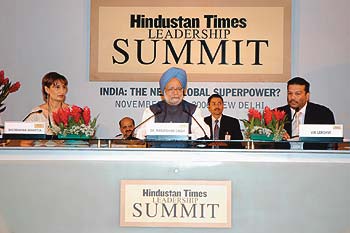India Should Embrace Technology
Hindustan Times |
By Gaurav Chowdhury
India needs to quickly embrace technology, modernise retail trade and focus on infrastructure development to spin jobs and boost incomes. If it fails to do so, the growth process may leave behind a significant section of the population and bring on socio-political upheavals that the country can ill-afford, leading geo-strategist Parag Khanna has cautioned.
"There is irrefutable evidence that global supply chains create jobs," Khanna said on the sidelines of the Hindustan Times Leadership Summit here. "Technological progress replaces people. But it creates far more jobs than it destroys. Retail is also part of the same process of modernisation," said Khanna, a director at the Hybrid Reality Institute. In his latest book Hybrid Reality: Thriving in the Emerging Human Technology Civilization, Khanna makes a case for 'geo-technology' as the third edifice of modern development paradigm, along with geo-politics and geo-economics.
The government has withstood mounting political pressure to roll-back decisions to allow foreign direct investment (FDI) in multi-brand retail, to hike diesel prices and to cap the sale of subsidised cooking gas. "I would urge politicians to not be too concerned about the rather fallacious argument that modernisation and technology lead to loss of livelihood," he said. "Globalisation of supply chain demonstrably raises the standard of living and improves lives. That is true of iron miners in Zambia as well as women in rural India."
In the absence of intelligent policy and appropriate focus on infrastructure, India's so-called 'demographic dividend' could well turn out to be a legacy that will be difficult to shrug off, warned Khanna. "Demographic dividend is not value-neutral," he said. "There is no such thing as demographic dividend unless we use it well."
"I would say at this point, India is kind of 50:50. It may reap dividends of this army of youth joining the workforce. But it may equally fail to do so. I am of the view that Indian demography has been a curse, as of now. You cannot wipe away the legacy and erase the past," he said.
On corruption, Khanna said "it is not an India-specific problem" and infrastructure - or rather the lack of it - is hurting India's growth process more than any other aspect. "There are several instances of highly developed societies that are also highly corrupt," Khanna said. "There is no doubt that corruption is a nuisance and a hindrance to growth, but it is a largely universal problem, unless you are talking about Norway or Singapore," Khanna added.
"Infrastructure, apart from creating jobs and income, also empowers people. Telecommunication is the biggest example of how the freedom of physical mobility has empowered people and resulted in immense gains for society and economy," he said.
